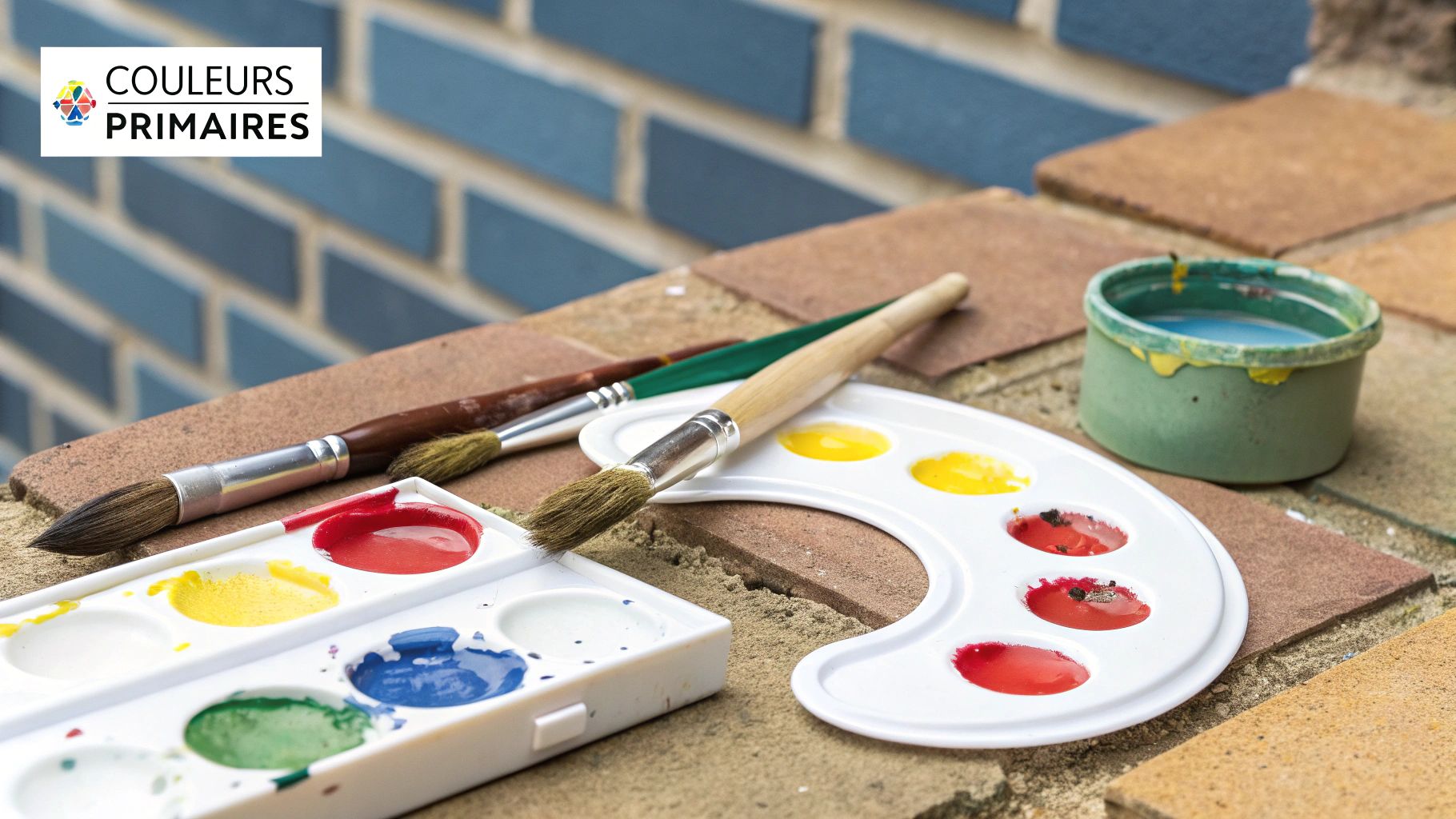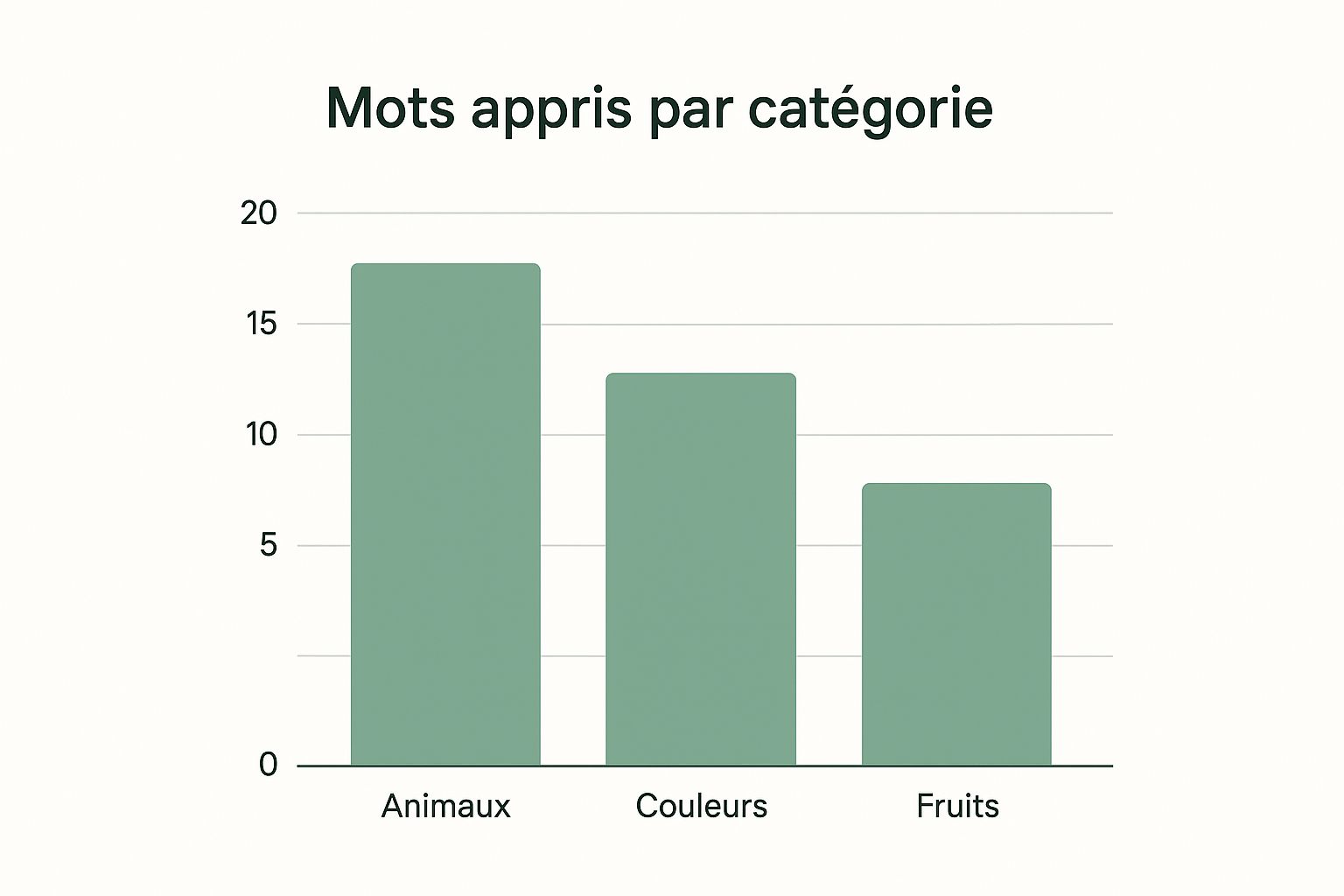Forget endless word lists and boring lessons. Think of learning as a treasure hunt, a moment of bonding shared as a family. That's exactly what Vocabulon des petits promises: to transform vocabulary discovery into an adventure that nurtures language, creativity, and self-confidence.
But what is the little ones' Vocabulon?
Much more than just a board game, Vocabulon des petits is a true bridge between fun and your child's development. It was designed to cultivate the natural curiosity of toddlers and help them build a healthy and joyful relationship with words, far removed from academic pressure.
This game is a complete game changer. It takes a concept that can sometimes seem a bit serious, like learning vocabulary, and transforms it into a moment of pure fun. Each game is a new opportunity to strengthen language, of course, but also self-confidence, an essential skill for personal growth.
An educational tool that grows with your child
What makes this game so special is its caring approach. There's no competition or race for performance here. Just the joy of exploring together and watching your child flourish.
- Perfect for beginners : It accompanies children from their first explorations of words and sounds.
- Boosts Confidence : Every word found is a small personal victory that increases self-esteem.
- Arouses curiosity : Colorful and playful worlds nourish their natural desire to understand the world around them.
The idea is not to memorize words by heart, but to give children the pleasure of putting words to what surrounds them, to their emotions, and to share what they have learned.
Specifically, the game is specially designed for children aged 3 to 6. It offers six progressive activities to familiarize themselves with the alphabet and discover 120 key words . Everything takes place in worlds that speak to children, such as the enchanted forest or the pirate island. To find out more, don't hesitate to take a look at the information from the publisher Mégableu.
Beyond Words: A Springboard to Confidence and Emotional Intelligence

Learning new words is great. But that's just the tip of the iceberg. Behind the scenes, Vocabulon des petits plays a much deeper role in your child's well-being. It's not just about piling up words in their memory, but about building their self-confidence, step by step.
Think of each game as a series of small successes. Finding the right picture, answering a riddle, or even just daring to speak up... these are all victories that build their self-esteem. They discover that their efforts matter, a fundamental lesson that will stay with them throughout their lives.
Putting emotions into words: a key skill
A rich vocabulary isn't just for speaking well. It's essential for emotional well-being. Having more words at their disposal helps your child better identify, understand, and share their feelings. It's a giant leap toward emotional intelligence.
A child who can say, "I'm frustrated because..." or "I'm really proud of myself!" is a child who is learning to explore their own inner world. Rather than submitting to their emotions, they are learning to name them and, little by little, to tame them. Play becomes a wonderful excuse to open a dialogue about emotions within the family.
Play transforms a school skill—vocabulary—into a true personal development tool. It creates a bridge between words and feelings, giving your child the keys to better understanding and communicating.
To help you along the way, here are some practical tips for getting the conversation started during a game:
- “Do you think this pirate looks happy or angry? What makes you say that?” This helps them connect an emotion to a visual cue and develop empathy.
- “Do you remember a time when you felt brave, like this knight?” This simple question connects the game to one's own life and values their experiences.
- “If this fairy could talk to us, what do you think she would say?” This is a great way to stimulate their imagination and their ability to put themselves in other people's shoes.
Create a family ritual around words

For the magic of Vocabulon for Kids to truly work, the secret is to gently integrate it into your daily life. Think of it less as an exercise and more as a friendly gathering that everyone looks forward to. The goal isn't to recreate a classroom in your living room, but to create warm memories and strengthen family bonds around words.
By making play a ritual, you show your child that learning is, above all, a time for sharing and fun. This could be a Wednesday afternoon "word snack" or a small "weekend challenge" with the family. The key is to create a relaxed atmosphere, without any pressure to succeed.
How to create your own tradition?
The easiest way is to find a time slot that fits naturally into your family's routine. Make this time special, even if it's short. A 15-minute gaming session every week, filled with laughter and bonding, will have a much greater impact than a long, forced game.
Here are some ideas to get you started:
- Sunday Morning Game: While breakfast is heating up, pull out the game for a quick game. It's a great way to start the day together.
- The Generation Challenge: Involve grandparents, even via video call! Draw a card and ask them to share a memory related to the word. It's a wonderful way to create intergenerational connections.
- The portable game: Slip a few cards into your bag during a trip to the park or for a car ride. The waiting times then become opportunities to share and feed your curiosity.
The most important thing is to remain flexible. If your child is tired, don't force them. The goal is to build positive memories, where learning happens without even thinking about it, thus strengthening their confidence and love of discovery.
Sometimes the rules of the game can seem a little complex for younger children. Don't hesitate to adapt them! You can play in teams, forget about keeping score, or simply use the cards as a starting point for discussions and inventing stories. By making the Vocabulon des petits your own, you're making it a powerful tool for your child's development.
What if we reinvented the rules of the game to boost creativity?
The Vocabulon for Little Ones box is much more than just a board game. Think of it as an invitation to explore your child's boundless imagination far beyond the written rules. The goal is no longer just to find the right word, but to make each card a spark of creativity and personal expression.
By thinking outside the box, you open up a wonderful space for your child to express who they are. This is a particularly beneficial approach for those who are less comfortable with competition. Here, the focus isn't on winning or losing, but on cooperation and inventiveness. Each game then becomes unique, a reflection of their personality.
Go beyond the basic game
Changing the rules is a great way to promote other forms of intelligence and boost self-confidence. Here are some simple ways to reinvent your games:
- Storyteller: Draw three cards at random. Let's say "pirate," "cake," and "moon." Together, challenge yourselves to come up with a story—no matter how crazy—that connects these three elements. Everyone can take turns adding a sentence to build a unique adventure. This is a great collaborative exercise.
- The Drawer or the Mime: A player draws a card and, without saying a word, must have the others guess it by drawing it or miming it. This is a fantastic exercise for developing nonverbal communication, empathy, and problem-solving skills while having fun.

Themes like animals are wonderful gateways to a child's imagination. They invite them to dream, create, and express their own ideas.
By adapting the game, you show your child that their creativity is as valuable as knowledge. You teach them that the rules are there to guide them, but their imagination has no limits.
To give you even more ideas, here's a table that suggests alternative activities. The goal is to emphasize creativity, self-expression, and, above all, the joy of creating as a family.
Ideas for reinventing the Vocabulon game
| Type of activity | Benefit for the child | Concrete example to try with the family |
|---|---|---|
| Shadow Theatre | Stimulates imagination and fine motor skills. | Turn off the light, use a flashlight and the cards to cast shadow puppets. Invent a little play. |
| Treasure hunt | Encourages observation and curiosity. | Hide objects around the house that match the cards you've drawn. Your child will search for them, turning learning into an adventure. |
| The game of emotions | Develops emotional intelligence and empathy. | Draw a card (e.g., “rain”) and ask, “How would you feel in the rain?” Act out joy, sadness, etc. |
| Sound Bingo | Refines listening and sound/image association. | Draw a card and imitate the sound of the object or animal. The first player to recognize the sound wins the card in a good mood. |
These variations transform the Vocabulon of the little ones into an almost inexhaustible resource for personal and family development.
What's next? Transition smoothly to Vocabulon Junior
Your child has explored the worlds of Vocabulon for Little Ones , and you feel they're ready for a new challenge? That's great news! Moving on to Vocabulon Junior isn't just another step; it's a way to celebrate their progress and growing curiosity. It's the perfect time to show them that learning is an adventure that grows with them.
Generally, this transition happens naturally. You'll notice your child's mastery of the words and concepts in the first version becoming increasingly clear. If they begin to read more fluently and ask more complex questions, they're probably ready. Vocabulon Junior is designed to support them throughout their elementary school years (ages 6-12).
From educational game to development companion
What's really changing? The game aligns with the skills expected in school, making learning even more concrete and motivating. We're no longer just naming images: we're exploring definitions, synonyms, and word families—powerful tools for refining our thinking and expression.
Moving on to Vocabulon Junior is, above all, acknowledging that your child has grown. It's a powerful message you're sending them: "I see your progress, I know you're capable of going further, and I'm proud to support you in this new stage of your development."
This new version continues to cultivate the love of words, always in a fun way. Moreover, Vocabulon Junior, which has already won over more than a million children , offers three levels of difficulty (CP, CE1/CE2, CM1/CM2) and focuses on 1,500 essential words from primary school vocabulary.
If you'd like to know more, don't hesitate to discover the details of this enhanced version . By presenting this new game as a recognition of his efforts, you'll fuel his pride and his desire to continue exploring the treasures of the French language.
Questions you may have about the Vocabulon for Little Ones
As a parent, we always have a thousand questions before bringing a new toy into the home. That's completely normal! Here are some answers focused on your child's well-being and development.
How should I react if my child is frustrated about losing?
Frustration over failure is a healthy emotion and a learning opportunity. The trick is to defuse it. Rather than aiming for victory, suggest "discovering things together."
Top tip: Play as a team! Set a joint challenge: "Come on, shall we try to find five words about farm animals together?" Always value the effort rather than the result. A sentence like "Well done for trying that difficult word!" is so much more powerful than a simple "No, that's not it." This teaches him something essential for his self-confidence: making mistakes is part of the journey.
How do I know if my child is really ready for this game?
Forget the age on the box. The best indicator is your child's curiosity. If they're starting to show interest in letters, pointing at words in their books, or constantly asking, "What does that mean?" then it's probably a good time to introduce them to Vocabulon for Little Ones .
Helpful tip: At first, the only rule is to have fun. Don't feel obligated to follow the instructions exactly. Sometimes it's enough to look at the pictures together, name what you see, and let your imagination run wild with wild stories. The game should adapt to your child, not the other way around.
What if my child gets bored with the game?
It's inevitable. To keep the game from gathering dust, make it special. Don't take it out every day. Make it a family ritual, a special, eagerly awaited moment.
Practical tips to rekindle the flame:
- Mime and Riddles: Draw a card and have the other person guess the word without speaking. Laughter guaranteed!
- Creative workshop: The cards can serve as inspiration for a family drawing or modeling session.
- Create your own cards: Print photos of your last vacation, the dog, or items from around the house to create unique and personal cards that reinforce the connection between play and life.
Is this game suitable if my child has language difficulties?
Absolutely. It's even an excellent support tool, on one condition: use it in a supportive environment, without any pressure. The fun aspect helps to demystify learning and make it more accessible.
Practical advice: Choose quiet, one-on-one time. Focus on a small number of words at a time and celebrate each small success with great enthusiasm. Vocabulon des petits can be an ally in enriching your child's vocabulary and, above all, in giving them confidence in their ability to express themselves. Don't hesitate to talk to a speech therapist, who can give you personalized advice.
To continue cultivating your child's confidence, creativity, and well-being every day, discover the My Book Story notebook. It's the perfect companion to help them put their emotions into words and explore their inner world, page after page. Explore the My Book Story notebook and give them space to grow .


